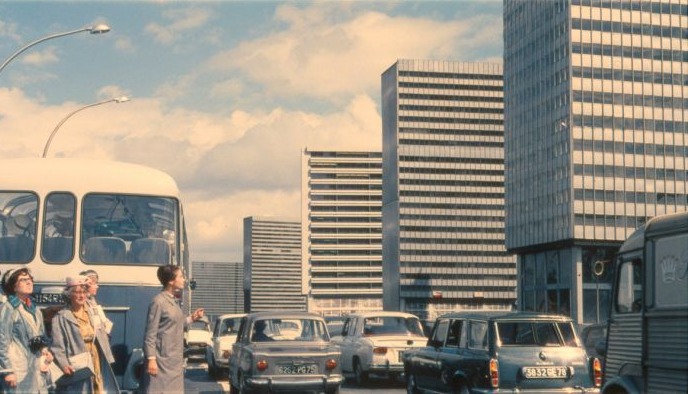
Movies Worth Watching: Playtime (1967)
Like the previously profiled Brewster McCloud (1970), Playtime is another title with a long history of unavailability. The good news is that the Criterion Collection offers a beautiful DVD edition that's worth every dollar. The bad news is the tragic story of its production.
In the 1950s, French comedian/auteur Jacques Tati was riding high on critical and commercial success, winning Best Foreign Film Oscars and entertaining Europe with his satirical silent-film style of comedy. (His influence is especially felt in Monty Python and Rowan Atkinson's Mr. Bean character.)
Therefore, he was able to get funding for his dream project: a multicharacter comic exploration of a modern city, playing at an epic length in 70mm. Being the perfectionist he was, no existing city fit his specifications, forcing him to build a city in the French countryside.
Although not fully to scale, this set (called Tativille) had actual inhabitable buildings with water and electricity, city streets, traffic lights, freeways, you name it.
And from there things got bad. Although production started in 1962 (I think), constant problems and Tati's snail's pace dragged the film out until 1967. By then, Tati's big budget and observational style seemed quaint up against the likes of the French New Wave. Critics panned Playtime, and it flopped pathetically.
The outrageous investment Tati had put into the film (including his personal savings) caused him to lose his house, property, and the rights to Playtime and all his other films. To add insult to injury, Tativille (which was intended to become a film school after production ended) was repossessed and torn down.
By the time it made it to America, the film was in a heavily butchered state that barely reflected what Tati intended.
But over the decades Playtime's mystique grew and it developed a cult following. In the 90s, Tati's family was able to put together a restoration that combines all the remaining footage from the original cut, which is what is available today.
So what makes Playtime more than an odd footnote in film history?
For one thing, it plays like no other film you've ever seen.
There is not a single close up. Heck, anything closer than a long wide shot is a rarity. There is also an almost total lack of dialogue. There are voices on the soundtrack, but they are either about trivial things like hotel room numbers, or in languages you don't understand.
There is a story, but there is no "plot". One sequence just follows another, just like a person would explore a city in real life.
A group of American tourists arrive in "Paris". The airport is so bland that it is indistinguishable from an office building or a hospital. The tourists get stuck in traffic on the freeway. An old man, M. Hulot (Tati himself) tries all morning to meet with his banker. He gets shuffled from one waiting room to another. Meanwhile the tourists visit an expo of tacky and useless products.
Everything in the first half of the film suggests that we have entered Hell. Everything about this environment is so impersonal, so calculated, and so bereft of vitality... but so familiar. This is our globablized world.
But something magical is going on. A "hip" restaraunt is trying to prepare itself for its grand opening while still under construction. The human element keeps getting in the way-- the restaurant would run fine if it weren't for the people. Eventually the tourists and Hulot end up there accidentally... and the place literally falls apart, bit by bit.
As people's mistakes "ruin" the "perfect" environment, the customers open up, become more relaxed, friendlier. They start making their own fun in the surroundings, instead of having entertainment fed to them by a higher economic power.
By dawn, the city has transformed. What was once Hell is now Heaven, where joyful sights and amusing stories are everywhere.
The secret is paying attention.
That's what Playtime is about: attention. The odd formal properties of the film force the audience to pay extreme attention if they want to understand anything. We are so used to the predigested formula that when we encounter something this radical, we revolt.
But maybe we have to break ourselves out of that mold. Maybe that's how we should see the world.
For as long as there is a place with humans, there are stories. There are emotions. There are little jewels of behavior. You just have to... pay attention to what's happening.
And with that in mind, Tati suggests, anytime becomes Playtime.
"From near to far, from here to there: funny things are everywhere." - Dr. Seuss



No comments:
Post a Comment